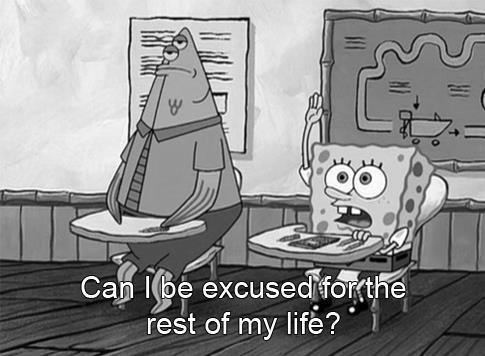
With the Internet, everything seems possible. We can learn the latest celebrity gossip, learn how to fly planes, and we can even learn history, english, math and HTML code.
So what’s the point of post-secondary education?
Those of us that’ve written research papers know the first place we look for information is Wikipedia, and although the information can easily be altered (or just plain untrue), the “References” guide at the bottom of the page links reputable sources that provide more reliable information.
So…what’s school really good for then? Here are some pros and cons of the Internet vs. post-secondary school education:
Pros
- The people that you will avoid. We all know those people – maybe I’m talking about you – that bring laptops and visit Facebook, Twitter, and Instagram or take selfies, or look at gossip sites. Some people even bring food, listen to music, fall asleep in class, or are really tall and they sit right in front of you and there are no seats left and you miss the entire lecture. Which is such a waste.
- You can wear whatever you want. Pajamas, your Teenage Mutant Ninja Turtle T-shirt, that little black dress in your closet. And it doesn’t stop there; you don’t have to spend hours perfecting your hair style.
- You can lie in bed all day. You don’t even have to get out of bed to memorize the origin of the Magna Carta, what it does, or why it was created.
- Finally – and maybe this should’ve been first – the money. One class is nearly $600. With the Internet, you’re just paying for the gigabytes, and that may be cheaper than four to six classes in one semester.
- You go at your own speed.
- You can focus on what you want to learn.
- The Internet provides opportunities to test yourself as often as you want.
Cons
- One of the benefits of attending lectures is hearing the professor talk; taking notes. Some of them are engaging, helpful, entertaining, funny and just great to listen to. It is a lot better than staring at a screen for endless hours, not to mention the social interaction and assistance. Professors are there to help and provide guidance to each student (at least that’s what I’m choosing to believe, given my experience with profs).
- Discussing concepts and analyzing texts (whether you’ve done the reading or not) encourages engagement. These conversations provide different perspectives and encourage individuals to research further into the subject, and as a result, everyone can learn something new or more on the topic than before.
- Lectures provide something new. On the internet you’re trolling several sites. It can provide the same information presented in different formats. And then comes accuracy. Just because it’s not Wikipedia, doesn’t mean the site is reputable.
- Reading, writing, research and the endless list of skills you can learn when attending lectures. HTML code can be learned on the Internet, but when you’re asked to apply those skills to test your knowledge, that is when you see how your learning has paid off.
- More hands on. Other than discussions and tests, post-secondary education can provide you with extra opportunities that the Internet may not provide you with such as field trips and exchange programs.
It’s all about finding a balance. Yes, there are some things that can be easily mastered via the Internet but it comes with consequences: ie. constant eye strain, the lack of social interaction.
Let’s just forget the significance of a degree for a second. Attending university is a great place to meet people and you are provided with endless opportunities. For example, career centers, career fairs, clubs catered to at least one interest of yours, professors that can make a positive impact on your life, good friends and okay, it might be seriously expensive, but the value of experience outweighs the amount of information you may learn on the Internet. On the web, you’re constantly learning facts, and you can choose your own hours, but there’s a question of accuracy and reliability. Although several classes from various universities are starting to offer classes online, finding what works best for you is what’s important.
Other than the Internet and going to school, the library also has an endless assortment of knowledge. What’s important, however, is trying to figure out how you can learn what you want to learn about and how that’ll help you succeed.